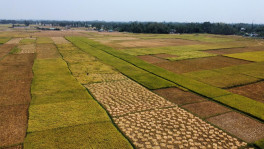Bangladesh and Japan to negotiate economic partnership agreement
An EPA would suppress the effect of the status change on Bangladesh's exports to Japan

Bangladesh and Japan are poised to initiate discussions on an economic partnership agreement by the end of the month, according to information obtained by Nikkei.
The two nations aspire to finalize the agreement in 2025. Japan is a major importer of textiles from Bangladesh, and numerous Japanese enterprises have made investments in the South Asian country, reports Nikkei.
According to reports, an EPA would suppress the effect of the status change on Bangladesh's exports to Japan.
Meanwhile, Tokyo hopes Dhaka will lower tariffs on imported steel and automobiles -- which are around 10% and 25%, respectively -- as the Bangladeshi economy grows quickly and demand for infrastructure expands.
The sides will negotiate tariffs on rice and Japanese beef, or Wagyu, with Tokyo hoping to increase its agricultural product exports, says Nikkei.
Japan imported about $1.72 billion of goods from Bangladesh in 2022. Apparel, such as clothes and shoes, made up over 90% of the imports. Japan's exports to Bangladesh totaled about $2.57 billion, of which roughly 30% was iron and steel.
As of May 2023, 338 Japanese companies had offices or branches in Bangladesh, doubling over a decade, according to a research by Japan External Trade Organization. These companies could suffer a blow to business if the tariffs suddenly rise after Bangladesh is removed from the list of least-developed countries. In some cases, textile exports can be exposed to a tariff of over 10%.
This is the first time Japan will negotiate an EPA with a country that is about to lose its designation as a least-developed country.
The governments of Bangladesh and Japan began research about a potential EPA in December 2022. A report issued after the research suggested the countries begin negotiations, saying an EPA would not only lead to expanded trade and investment, but would also strengthen political and diplomatic relationships.
Japan also hopes to establish standards in tariffs and trade rules as Bangladesh explores a free trade agreement with China.


 Keep updated, follow The Business Standard's Google news channel
Keep updated, follow The Business Standard's Google news channel
















